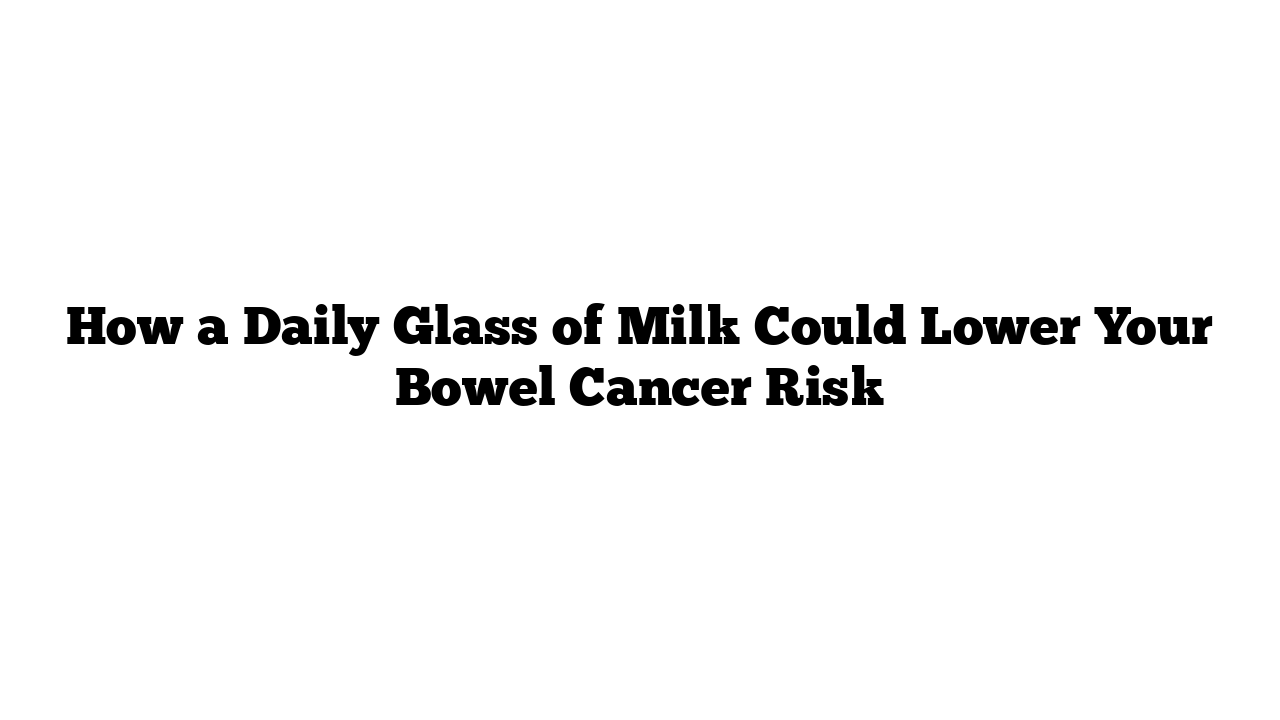The Power of Milk: Protecting Against Bowel Cancer
Milk is a staple in many diets, but did you know it might do more than build strong bones? Research has shown that drinking a glass of milk daily could lower the risk of bowel cancer. This nutrient-rich beverage contains vital compounds that may help protect your gut and improve overall health. Let’s dive into what makes milk so beneficial and how it could reduce your cancer risk.
What is Bowel Cancer?
Bowel cancer, also known as colorectal cancer, affects the large intestine and rectum. It’s one of the most common cancers in the USA, with factors like diet, lifestyle, and genetics playing significant roles in its development.
How Milk Helps Reduce Bowel Cancer Risk
Rich Source of Calcium
Milk is packed with calcium, a mineral known to protect the cells lining the colon. Calcium:
- Neutralizes bile acids and fatty acids that could harm the colon wall.
- Reduces inflammation in the gut.
- Supports healthy cell turnover, preventing abnormal growths.
Quote from Research:
“Higher calcium intake is associated with a 19% lower risk of colorectal cancer,” according to a study in the Journal of the National Cancer Institute.
Vitamin D Boosts the Effect
Milk fortified with vitamin D enhances calcium absorption and may further reduce the risk of bowel cancer by regulating cell growth and immune function.
Probiotics in Dairy
Some milk products, such as kefir or cultured milk, contain probiotics that promote a healthy gut microbiome, which plays a key role in reducing inflammation and improving digestion.
How Much Milk Should You Drink?
Recommended Daily Intake
Experts suggest drinking one glass of milk (8 ounces) per day to gain its protective benefits. For individuals with lactose intolerance, lactose-free milk or fortified plant-based alternatives like almond milk with added calcium and vitamin D are good options.
Exceeding the Limits
While milk offers many benefits, excessive consumption could lead to health issues like weight gain or high cholesterol, especially if full-fat milk is consumed in large quantities. Stick to moderate intake for best results.
Other Nutritional Benefits of Milk
Milk is more than just calcium and vitamin D. It also contains:
- Protein: Essential for muscle repair and growth.
- Potassium: Helps regulate blood pressure.
- Vitamin B12: Supports nerve function and red blood cell production.
Incorporating Milk into Your Diet
Creative Ways to Enjoy Milk
- Add it to your morning coffee or tea.
- Blend it into a smoothie with USA-grown fruits like bananas or strawberries.
- Use it in soups, oatmeal, or healthy baked goods.
Pairing Milk with Fiber-Rich Foods
Pairing milk with high-fiber foods, such as whole-grain cereals, can enhance digestive health and further reduce the risk of bowel cancer.
The Importance of a Balanced Diet
While milk plays a significant role, a balanced diet is crucial for preventing bowel cancer. Include plenty of:
- Vegetables: Broccoli, spinach, and kale.
- Fruits: Apples, blueberries, and oranges.
- Whole Grains: Brown rice, quinoa, and whole-wheat bread.
Trusted Sources of Information
For more health insights and explanations, visit medicaltimes.io. Check out these additional resources for further reading:
- American Cancer Society (cancer.org)
- Harvard T.H. Chan School of Public Health (hsph.harvard.edu)
- Mayo Clinic (mayoclinic.org)
FAQs: Frequently Asked Questions
1. Can milk really reduce the risk of bowel cancer?
Yes, studies show that milk’s calcium and vitamin D content can lower the risk of colorectal cancer.
2. Is plant-based milk as effective as regular milk?
Fortified plant-based milk with added calcium and vitamin D can offer similar benefits.
3. Can milk cause any side effects?
Excessive consumption or intolerance to lactose may cause bloating or digestive discomfort.
4. How much milk should I drink daily?
One glass (8 ounces) per day is enough to gain its protective benefits.
5. Are there alternatives for lactose-intolerant individuals?
Yes, lactose-free milk, almond milk, and soy milk are great options.
6. Does milk help other parts of the body besides the gut?
Absolutely! Milk supports bone health, muscle repair, and even nerve function.
7. What other foods reduce bowel cancer risk?
High-fiber foods, leafy greens, and fruits are excellent choices.
8. Can I still drink milk if I have high cholesterol?
Opt for low-fat or skim milk to enjoy its benefits without raising cholesterol levels.
9. Does milk prevent other types of cancer?
Research is ongoing, but milk may help reduce the risk of certain cancers, like breast and prostate cancer.
10. Is organic milk better for preventing cancer?
Organic milk can reduce exposure to hormones and pesticides, but its nutritional content is similar to regular milk.
